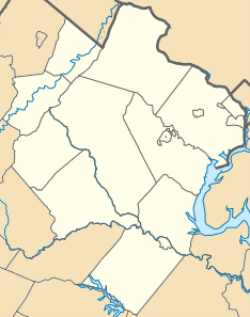Warm Springs is a census-designated place (CDP) in and the county seat of Bath County, Virginia, United States. The population as of the 2010 census was 123. It lies along U.S. Route 220 near the center of the county. Warm Springs includes the historical mill town called Germantown. To the west lies West Warm Springs.
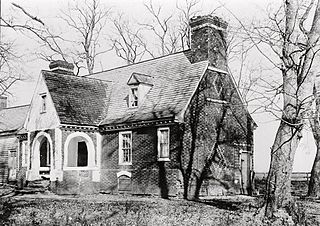
Malvern Hill stands on the north bank of the James River in Henrico County, Virginia, USA, about eighteen miles southeast of Richmond. On 1 July 1862, it was the scene of the Battle of Malvern Hill, one of the Seven Days Battles of the American Civil War.

Green Springs National Historic Landmark District is a national historic district in Louisa County, Virginia noted for its concentration of fine rural manor houses and related buildings in an intact agricultural landscape. Admitted to the National Register of Historic Places in 1974, it became the first rural National Landmark Historic district. Named for one of the historic manor houses, the district comprises 14,000 acres (5,700 ha) of fertile land, contrasting with the more typical poor soil and scrub pinelands surrounding it.
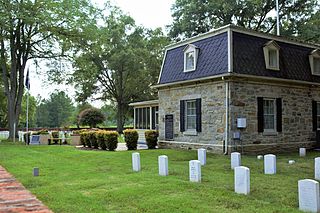
Fort Harrison National Cemetery is a United States National Cemetery located seven miles (11 km) south of the city of Richmond, in Henrico County, Virginia. Administered by the United States Department of Veterans Affairs, It encompasses 1.5 acres (0.61 ha), and as of the end of 2005, had 1,570 interments.

This is a list of the National Register of Historic Places listings in Henrico County, Virginia.

This is a list of the National Register of Historic Places listings in Spotsylvania County, Virginia.
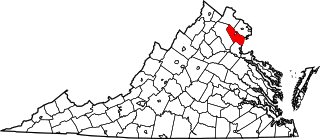
This is a list of the National Register of Historic Places listings in Prince William County, Virginia.

This is a list of the National Register of Historic Places listings in Mecklenburg County, Virginia.
This is a list of the National Register of Historic Places listings in Williamson County, Tennessee.

This is a list of the National Register of Historic Places listings in Hampshire County, West Virginia.

The Emmanuel Church at Brook Hill, in the historic community of Brook Hill in Henrico County, Virginia, is a historic Episcopal church.
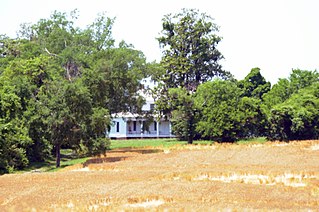
Tree Hill near Richmond, Virginia, in Henrico County, Virginia, is a Greek Revival style plantation house overlooking the James River about two miles east of downtown Richmond near the intersection of the historic Osborne Turnpike and New Market Road. Currently still a private farm, but expected to become partly a park after housing and commercial development, it was once owned by Richmond distiller and landowner Franklin Stearns, a prominent Unionist during the American Civil War. Centuries earlier, it had been a Native American camp site, and the birthplace of powerful chief Powhatan (d.1618).
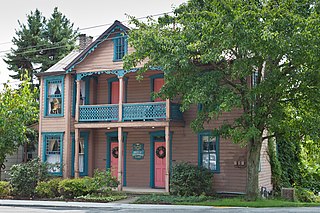
The Scenery Hill Historic District is a historic district that is located in Scenery Hill, Pennsylvania. It was listed on the National Register of Historic Places in 1996.

The Cherry Hill Farmhouse is a house museum in Falls Church, Virginia, United States. Built in 1845 in a Greek Revival architecture style, it belonged to wealthy farmer families until 1945, and in 1956 it became property of the City of Falls Church, which transformed it into a museum, as a historical building. Today, the Cherry Hill Farmhouse, along with other five such constructions in Falls Church City, is part of the National Register of Historic Places, as an important testimony of 19th century Victorian buildings in the area.

Green Springs was built in the late 18th century on lands in Louisa County, Virginia assembled by Sylvanus Morris. His son Richard (c.1740-1821) developed 1,746 acres (707 ha) near the mineral springs that gave the property its name and built the two-story frame house. The property stands in an unusually fertile region of central Virginia, surrounded by a number of 18th and 19th century farms and plantations. The district has been designated a National Historic Landmark district, comprising about 14,000 acres (5,700 ha) under scenic easement protection.

Bellevue Rural Historic District is a national historic district located near Forest, Bedford County, Virginia. It encompasses seven contributing buildings, five contributing sites, and one contributing structure. They are associated with the Bellevue School for Boys, Trivium, Brook Hill Farm, and Glenn Mary Farm properties. Brook Hill Farm and Bellevue are also listed separately on the National Register of Historic Places.

Frederick County Poor Farm, also known as the Frederick County Poorhouse, is a historic poor farm complex located at Round Hill, Frederick County, Virginia. The main building, erected in 1820, is a Federal style building that consists of a two-story brick main block and original lateral one-story brick wings with gable roofs. A nearly identical building is at the Shenandoah County Farm. Also on the property are a contributing brick spring house, secondary dwelling, blacksmith shop, storage building, poultry house, and board-and-batten outbuilding. The Frederick County Poor Farm remained open until 1947.
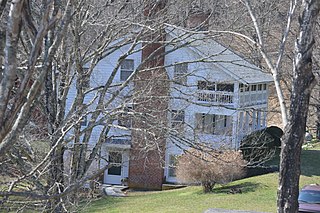
Brookside Farm and Mill is a historic grist mill and farm complex located at Independence, Grayson County, Virginia. The Brookside Mill was built in 1876, and is a three-story, three-bay by three bay, heavy timber frame building measuring 30 feet by 35 feet. The principal dwelling was built in 1877, and is a two-story, three-bay, frame building with a central passage plan. Other contributing buildings and structures include a brick spring house, brick smokehouse, log corn crib, frame hen house, miller's cabin, the miller's cottage or Graham House, a frame service station / garage (1918), and concrete dam (1914) and earthen mill race.

Snapp House, also known as Wildflower Farm, is a historic home located near Fishers Hill, Shenandoah County, Virginia. It was built about 1790, and is a two-story Continental log dwelling sheathed in weatherboard. It sits on a limestone basement and has a two-story, rubble limestone rear ell with a central chimney. A small frame structure connects the log section to the rear ell. Also on the property is the contributing site of a spring house.

Crabtree–Blackwell Farm is a historic farm located near Blackwell, Washington County, Virginia. The main house is a "saddlebag" type building with 2 1/2-story pens connected by a central limestone rubble chimney stack. The remaining Appalachian vernacular contributing resources are a spring house or milkhouse and log hay barn. The farm is representative of mountain folk culture.

